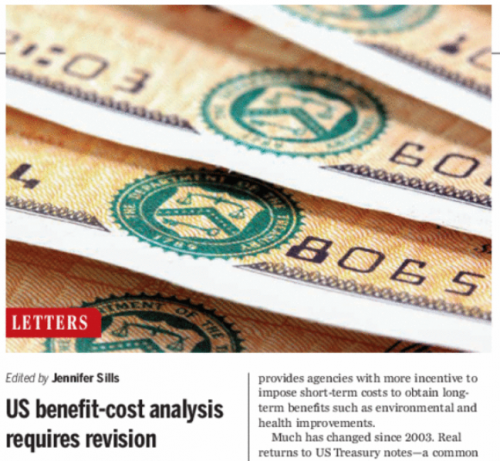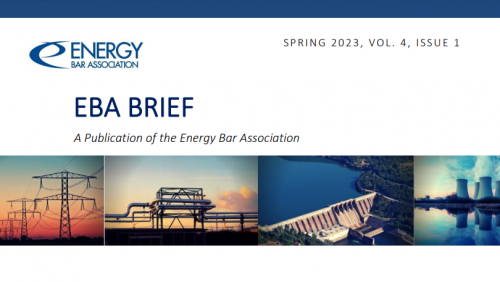-

US Benefit-Cost Analysis Requires Revision
Letter in SCIENCE Supporting Proposed Adjustment to Discount Rates in Circular A-4
A critical input in cost-benefit analysis is the discount rate, which determines how much impacts in the future are weighted relative to impacts in the present. Federal guidance currently calls on U.S. agencies to apply discount rates of 3% and 7%. But these rates, particularly the 7% rate, substantially devalue impacts that accrue to future generations, thus putting a thumb on the scale against policies that provide long-term benefits such as environmental and public-health regulation. In April, the Office of Management and Budget (OMB) proposed a comprehensive update to that guidance document, known as Circular A-4. Among other revisions, the draft would update the default discount rate used in federal regulatory analysis to 1.7%. In a letter published in Science, leading global experts on discount rates and cost-benefit analysis support the proposed revision.
-
Letter to Treasury Department on the Use of Carbon Matching for Hydrogen Tax Credits
Along with seven partners, we submitted a letter to the Department of the Treasury about the best methodology for determining lifecycle greenhouse gas emissions of hydrogen production when calculating the applicable amount of the 45V production tax credit (PTC). The letter had two primary purposes: (1) if local hourly energy matching is adopted as part of 45VPTC implementation, to highlight the critical importance of defining “local” in such a way that avoids increasing carbon emissions, and (2) to advocate for carbon matching as a more cost-effective and scalable alternative compliance pathway that also solves the problem that local hourly energy matching addresses.
-
FERC Environmental Justice Roundtable Comments
The Federal Energy Regulatory Commission (FERC), the agency responsible for regulating interstate energy infrastructure and markets, is seeking to better incorporate environmental justice into its decision-making. On March 29th, 2023, FERC held its first-ever Environmental Justice Roundtable where Policy Integrity’s Environmental Justice Director, Al Huang, testified and provided suggestions on how the Commission can identify, avoid, and minimize adverse impacts on environmental justice communities. We submitted additional comments to FERC on these issues, as well as on FERC's legal authority to incorporate environmental justice into its permitting decisions.
-
Comments to FERC on its Backstop Siting Authority
Following the passage of the Bipartisan Infrastructure Law, the Federal Energy Regulatory Commission (FERC) proposed implementing regulations for its authority to site transmission projects that have been rejected or not acted upon by states. We filed comments advising FERC that, to make these determinations and satisfy FERC's obligations under the National Environmental Policy Act, the Commission must consider how proposed transmission projects would affect emissions from power plants. Our comments further recommend improvements to the proposed rule's environmental justice provisions, which also relate to FERC's obligation to ensure that proposed projects are consistent with the public interest.
-
Amicus Brief on Major Questions Doctrine in Loan Settlement Case
We filed an amicus brief in a Ninth Circuit loan settlement case in support of neither party to address the proper application of the major questions doctrine. Our brief takes no position on whether the major questions doctrine ultimately applies to the case, nor does it take a position on how the Ninth Circuit should ultimately decide the case. It does explain that, although the Supreme Court’s major questions precedents often reference the economic significance of an agency’s action, none of the Supreme Court’s precedents, including West Virginia, turns on this factor.
-
Comments to the CPSC on Chronic Hazards Associated with Gas Ranges and Proposed Solutions
In March 2023, the Consumer Product Safety Commission (CPSC) published a Request for Information on Chronic Hazards Associated with Gas Ranges and Proposed Solutions. We submitted comments which highlighted the major findings from our report. We explained how the CPSC could regulate gas ranges and recommened possible futher actions.
-

The Impact of West Virginia v. EPA on Challenges to FERC’s Authority Under the Major Questions Doctrine
Published in Energy Bar Association Brief
The Supreme Court’s recent applications of the major questions doctrine have prompted numerous challenges to pending or proposed regulatory actions, including the Federal Energy Regulatory Commission’s (FERC’s) proposed revisions to Order No. 1000’s regional transmission-planning and cost-allocation rules (Transmission Rulemaking) and updated draft policy statements on certification of new interstate natural gas facilities (Draft Policy Statements). This article addresses the impact of West Virginia v. EPA—the most recent Supreme Court case involving the major questions doctrine—on FERC’s regulatory authority.
-
Comments to DOE on Proposed Efficiency Standards for Conventional Cooking Products and External Power Supplies
We submitted comment letters to the Department of Energy (DOE) on its proposed rules to strengthen energy conservation standards, respectively, for consumer conventional cooking products and external power supplies. Our comments applaud the agency for appropriately applying the social cost of greenhouse gases to estimate the climate benefits of the proposed standards. We also suggest that DOE apply additional analysis to each rule using draft updated climate-damage valuations that the Environmental Protection Agency released in November 2022.
-
Comments to NY Public Service Commission on Energy Storage Roadmap
We submitted recommendations to the New York Public Service Commission regarding New York’s 6 GW Energy Storage Roadmap: Policy Options for Continued Growth in Energy Storage, a document that analyzes the need to increase New York’s storage target to 6 GW and the barriers to storage deployment, and provides policy recommendations to help the state achieve 6GW of storage deployment by 2030.
-
Policy Integrity to Assist with New EPA Environmental Justice Program
As part of a coalition led by WE ACT for Environmental Justice, the Policy Integrity will help support a newly formed Environmental Justice Thriving Communities Technical Assistance Center.












